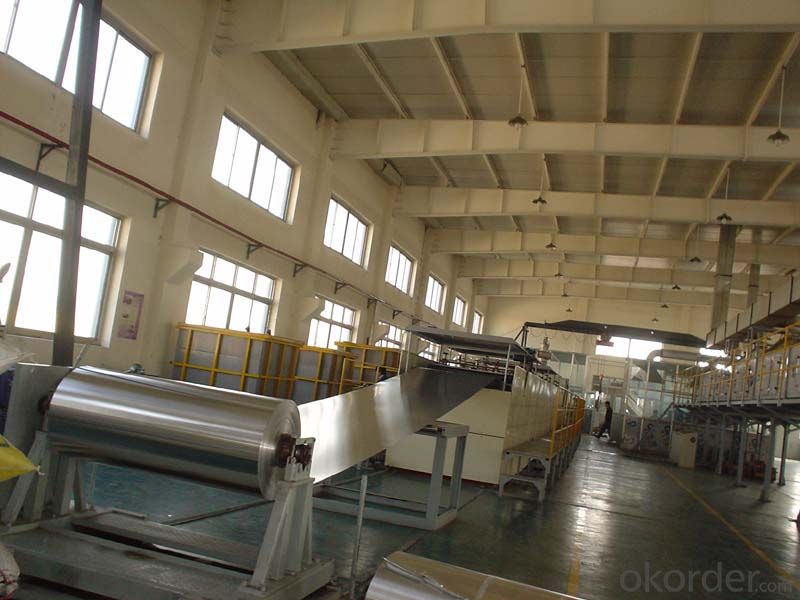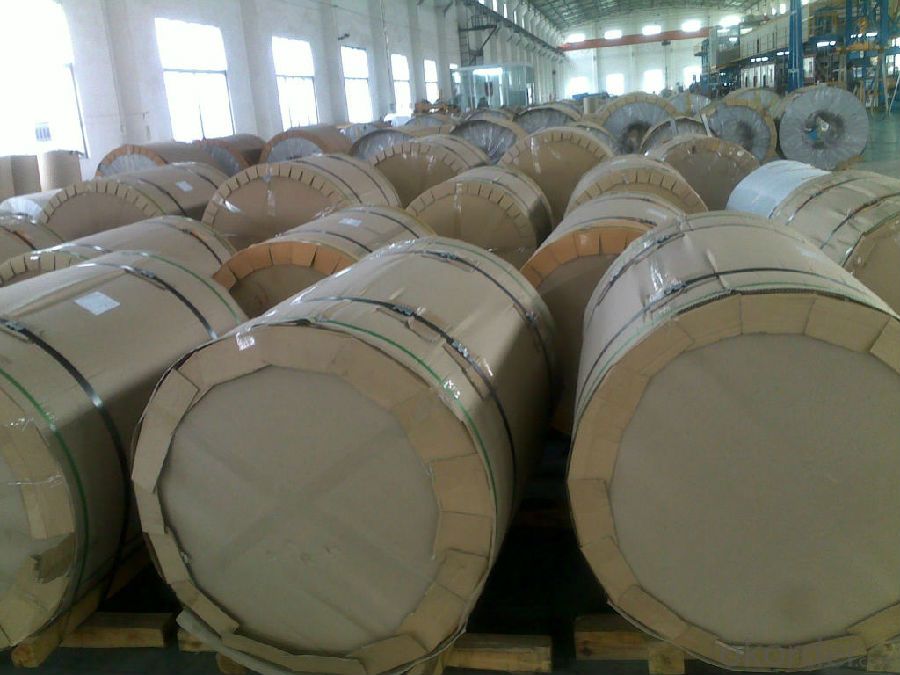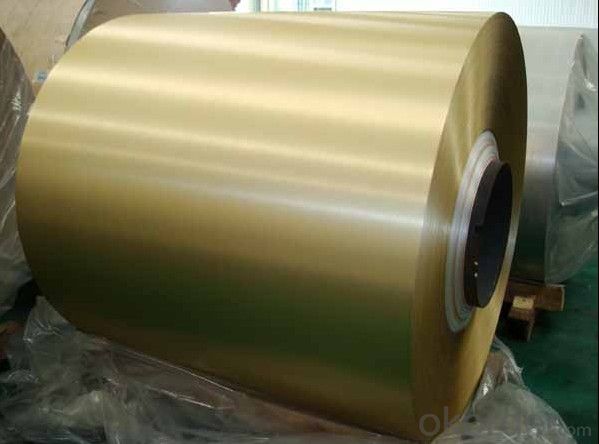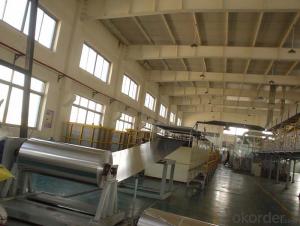Aluminium Alloy Plate/Coil 1100,2002,3105,5083,6061
- Loading Port:
- Shanghai
- Payment Terms:
- TT OR LC
- Min Order Qty:
- 5 m.t.
- Supply Capability:
- 90000 m.t./month
OKorder Service Pledge
OKorder Financial Service
You Might Also Like
Item specifice
Product Specification
| Alloy Band | 6061, 6063, 6082 |
| Temper | O, T4, T6, T651 and other |
Thickness | ≤170mm |
Width | ≤2200mm |
| Longth | ≤12000mm |
| Application | Automobile, Aviation, Electronics, Mold, Quenched plate, Pre-stretched plate, etc |
| Standards | ASTM-B209. EN573-1, GB/T3880.1-2006 |
| MOQ | 5 tons |
| Payment Term | L/C; T/T. |
| Delivery Time | Within 30 days after receipt of deposit. |
| Notice: We can according to customer requirement offer other different alloy band and state product. | |

More products for you to choose
• 1. Packaging Aluminium - 1060 3104 3105 8011 8021, etc.
Product Feature - Good moisture-proof performance, shading performance and high hinder performance.
• 2. Automotive Aluminium - 5182 5083 5754 5052 5042 6061 6063 6082, etc.
Product Feature - Beautiful in appearance, remarkable in bake harden ability, high in safety coefficient.

• 3. Building & Construction - 1060 1100 3003 5052, etc.
Product Feature - Light-weight, good processing performance, anti- corrosion, easy to maintain.
• 4. Transportation Aluminium - 1060 3003 5052 5754 5083 4104 6061 6016, etc.
Product Feature - High intensity, anti-corrosion, good wielding ability.

- Q:Can aluminum coils be used for radiation shielding?
- Yes, aluminum coils can be used for radiation shielding. Aluminum is a commonly used material for radiation shielding due to its high atomic number and density, making it effective at absorbing and scattering radiation. Aluminum can effectively shield against a wide range of radiation types, including gamma rays and X-rays. Additionally, aluminum is a lightweight and malleable material, making it easy to work with and suitable for various applications where radiation shielding is required, such as in medical imaging, nuclear power plants, and aerospace industries.
- Q:Can aluminum coils be used in high-altitude environments?
- Yes, aluminum coils can be used in high-altitude environments. Aluminum is a lightweight and corrosion-resistant material, making it suitable for various applications, including in high-altitude environments. Aluminum coils are commonly used in air conditioning systems, heat exchangers, and refrigeration units, which can function efficiently at high altitudes. Aluminum's high strength-to-weight ratio allows it to withstand the extreme conditions found at high altitudes, including low temperatures, high winds, and low atmospheric pressure. Additionally, aluminum is non-magnetic, which is advantageous in certain high-altitude applications, such as aerospace and satellite technologies. Furthermore, aluminum has excellent thermal conductivity, allowing it to efficiently transfer heat, making it ideal for use in cooling systems operating in high-altitude environments. Its corrosion resistance properties also make it durable and able to withstand the effects of moisture, which can be prevalent in such environments. Overall, aluminum coils are a reliable and suitable choice for use in high-altitude environments due to their lightweight, corrosion resistance, thermal conductivity, and strength.
- Q:Today at my school I was messing with this sketch thingy, the one with 2 knobs to twist up or down to draw, my friend decided to break it and when we broke it, this silver dust called aluminum powder got on my hands, I never knew it was dangerous cause your see, we never read the manual we just found it. About 3 minutes later he pointed to my hand and I saw blood. It kinda stung.
- The aluminum powder found in an Etch-a-Sketch will not cut you, it's much too small. In fact it's so small you could only see it's edges under a high powered microscope. The cut was most likely caused by jagged glass/plastic when you broke the Etch-a-Sketch open. It's not unusual to cut yourself and not realize until someone else sees you're bleeding.
- Q:What are the potential applications of coil-coated aluminum coils?
- Coil-coated aluminum coils have a wide range of potential applications due to their versatility and durability. Some common applications include roofing and cladding for buildings, automotive parts, signage, electronics, and appliances. The coil coating process enhances the aluminum's resistance to corrosion, weathering, and fading, making it suitable for both indoor and outdoor uses. Additionally, the ability to apply various colors and finishes to the coils allows for customization and aesthetic appeal in different industries.
- Q:What is the balanced equation for copper (I) oxide and Aluminum?
- Copper(I) oxide is a solid and so is aluminum. Any reaction that might occur would have to be at an elevated temperature. This is a thermite reaction in which copper(I) is reduced to copper metal (molten) and aluminum is oxidized to aluminum oxide. 3Cu2O(s) + 2Al(s) -- 6Cu(s) + Al2O3(s) ========= Follow up ========== Do you mean in aqueous solution? There won't be any copper(I) chloride in aqueous solution. CuCl is very insoluble in water, but will undergo disproportionation to form Cu2+ ions and copper metal. Therefore, you would actually have a solution of copper(II) chloride. Copper(II) chloride will react with aluminum to form copper metal and aluminum ions. Ordinarily aluminum won't react with copper(II) ions. The reaction does proceed in the presence of chloride ion. This is because the chloride ion will react with the Al2O3 layer on the surface of aluminum metal to make [AlCl4]^- which exposes the aluminum metal below, and thus a reaction can occur. 3Cu2+ + 2Al(s) -- 2Al3+ + 3Cu(s)
- Q:Can aluminum coils be used in extreme weather conditions?
- Yes, aluminum coils can be used in extreme weather conditions. Aluminum is a highly durable and corrosion-resistant material that can withstand harsh weather conditions such as extreme heat, cold, humidity, and even heavy rain or snow. It is frequently used in applications where weather resistance is crucial, such as in air conditioning systems, refrigeration units, and outdoor equipment. Aluminum coils are designed to be strong and reliable, making them suitable for use in extreme weather conditions without compromising their performance or longevity.
- Q:How do aluminum coils compare to nickel coils in terms of conductivity?
- Compared to nickel coils, aluminum coils typically exhibit lower electrical conductivity. This is mainly attributable to the fact that aluminum has a higher resistivity than nickel. Concerning conductivity, nickel emerges as a superior electrical conductor owing to its lower resistivity. Consequently, nickel coils are frequently favored in situations where high conductivity is vital, like in electrical circuits or heating elements. Nonetheless, it is crucial to acknowledge that aluminum coils still possess reasonable conductivity and may prove suitable for specific applications where cost-effectiveness or lightweight properties outweigh other considerations.
- Q:Are aluminum coils suitable for fire-resistant applications?
- No, aluminum coils are not suitable for fire-resistant applications. Aluminum has a low melting point and is highly flammable, making it a poor choice for fire-resistant applications. In fact, aluminum can even contribute to the spread of fire due to its combustible nature. For fire-resistant applications, materials such as steel or fire-resistant alloys are recommended as they have a higher melting point and better resistance to fire. These materials are designed to withstand high temperatures and are less likely to contribute to the spread of fire.
- Q:I'm 14 an was told that aluminum free deodorant would stop yellow stains on my white shirts, so which female deodorant would help stop yellow stains
- Aluminum salts are used in antiperspirants. So, skip anything that claims to be an antiperspirant. (Some things that are antiperspirants are sold as deodorants, but not the other way around.) Right Guard Sport spray does not contain aluminum salts, and my T-shirts stayed white after I switched to it. Many people mistakenly think that it is the sweat that discolors the armpits.
- Q:What are the common fabrication techniques for aluminum coils?
- Aluminum coils can be fabricated using several common techniques, including rolling, annealing, slitting, and coating. The primary fabrication technique for aluminum coils is rolling. This involves passing a continuous strip of aluminum through a series of rollers to gradually reduce its thickness and increase its length. The process can be done hot or cold, depending on the desired properties of the coil. To improve the mechanical properties of aluminum coils, annealing is often used. This heat treatment process involves heating the coil to a specific temperature and then cooling it slowly to relieve internal stresses and increase its ductility. This makes the coil easier to work with during subsequent fabrication processes. For cutting wide aluminum coils into narrower strips, the technique of slitting is employed. This involves passing the coil through sharp rotating knives that make precise cuts along the length of the coil. Slitting allows for customization and the production of coils in different widths, which can be used for various applications. Coating is another commonly used fabrication technique for aluminum coils. It involves applying a protective or decorative coating onto the surface of the coil to enhance its appearance and improve its performance. Various types of coatings, such as paint, anodizing, and powder coating, provide corrosion resistance, durability, and aesthetic appeal. In summary, these fabrication techniques are essential in transforming aluminum into coils that meet specific requirements for industries like construction, automotive, and aerospace.
1. Manufacturer Overview |
|
|---|---|
| Location | |
| Year Established | |
| Annual Output Value | |
| Main Markets | |
| Company Certifications | |
2. Manufacturer Certificates |
|
|---|---|
| a) Certification Name | |
| Range | |
| Reference | |
| Validity Period | |
3. Manufacturer Capability |
|
|---|---|
| a)Trade Capacity | |
| Nearest Port | |
| Export Percentage | |
| No.of Employees in Trade Department | |
| Language Spoken: | |
| b)Factory Information | |
| Factory Size: | |
| No. of Production Lines | |
| Contract Manufacturing | |
| Product Price Range | |
Send your message to us
Aluminium Alloy Plate/Coil 1100,2002,3105,5083,6061
- Loading Port:
- Shanghai
- Payment Terms:
- TT OR LC
- Min Order Qty:
- 5 m.t.
- Supply Capability:
- 90000 m.t./month
OKorder Service Pledge
OKorder Financial Service
Similar products
New products
Hot products
Related keywords





























